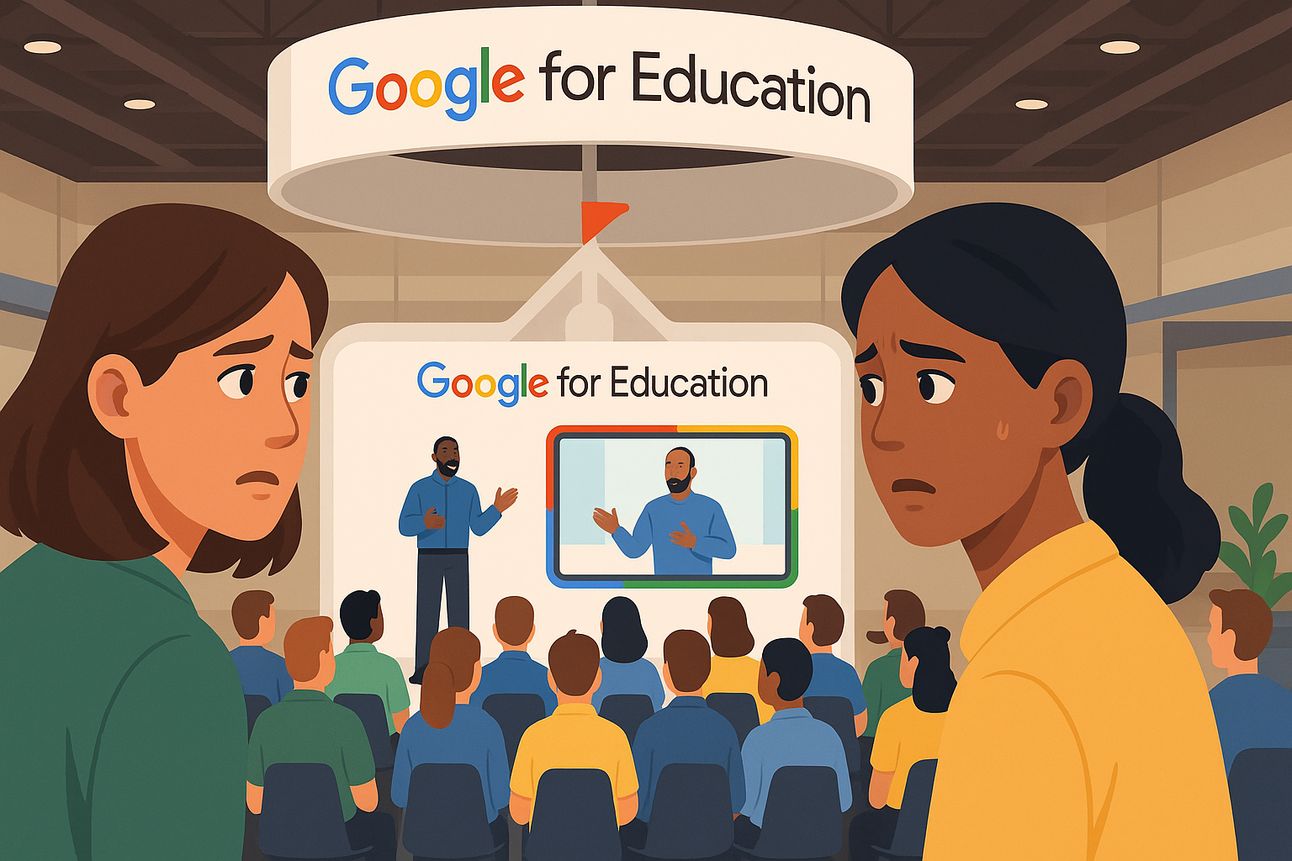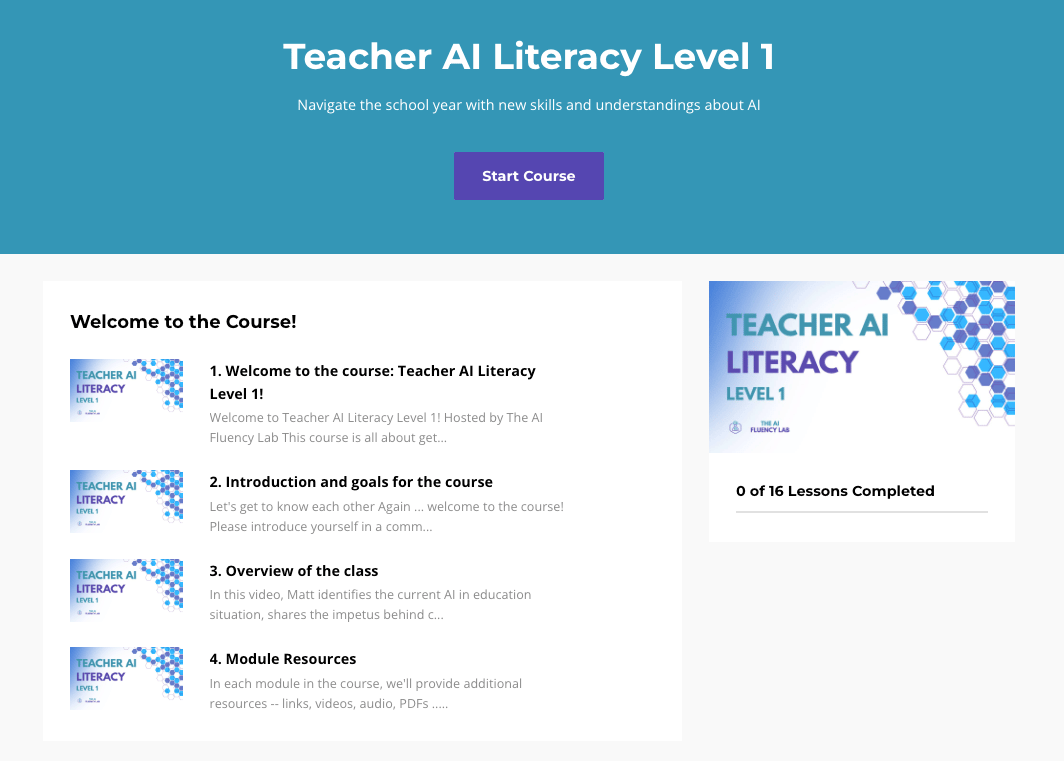
The ISTE Conference always brings out updates and new features in the edtech products we use in schools every day.
Companies love to make a splash at ISTE. It’s the biggest edtech event in the United States and one of the biggest in the world (maybe behind the BETT Show in London … although it’s a different breed of event.)
Take a peek at the tools you use and see if there’s anything different. For example …
Quizizz is now called Wayground.
Brisk Teaching is adding a feature I love called Bundles that lets teachers create multiple resources at once.
Diffit has new easier to use interface that looks more like a document.
SchoolAI is about to announce a huge makeover in mid-July.
Google is no different. They just announced widespread access to Gemini throughout their education products.
I’m all for using AI in the right places in the classroom …
… but this feels a little too much too fast for my liking.
Below, I share my three big concerns about this rollout — a lack of monitoring, that it’s always on, and a lack of AI literacy focus.
(By the way, the Teacher AI Literacy certification through The AI Fluency Lab could support that last one … and it’s still 50% off through this week!)
In this week’s newsletter:
🚨 LAST CALL: 50% off Teacher AI Literacy Level 1
📚 New AI resources this week
📢 Your voice: AI prompting
🗳 Poll: Google’s big AI updates
⚠️ 3 concerns about Google’s big AI in edu news
🚨 LAST CALL: 50% off Teacher AI Literacy Level 1
The Teacher AI Literacy Level 1 certification course is LIVE.
I just dropped 11 videos (more than an hour total) in my Cheating and Academic Integrity module — including a participant workbook and additional ebook.
More than 500 people from around the world have joined and started sharing comments in the discussion boards.
The good news? You haven’t missed a thing.
Everything is asynchronous — on-demand, on your own time — so you can watch and rewatch whenever you want.
And you get to learn alongside other educators by interacting with them in the discussion boards. Here’s a comment that just came in about the lesson on my “AI cheating spectrum” graphic …
This list is exactly why I signed up for this course. […] I am only at the beginning of my journey here, but I am excited to reflect on this list and use it to help me construct a new curriculum.
Until Friday: 50% off
Our “early adopter” pre-sale discount of 50% off has been extended until Friday.
You’ll get video content from all three of our AI Fluency Lab faculty — me, Ken Shelton, and Holly Clark.
The videos, resources, and discussion amongst other educators will get you ready for AI this school year — and help you prepare students for THEIR future.
And when you’re finished, you’ll be Level 1 Certified in Teacher AI Fluency.
Want to register a group? Email [email protected] for details and a quote.
📚 New AI resources this week
1️⃣ Teachers union partners with Anthropic, Microsoft and OpenAI to launch AI-training academy (via CBS News) — With the creation of the academy, leading artificial intelligence companies are stepping up their efforts to bring AI to schools across the U.S.
2️⃣ Opportunity: ISTE + ASCD Communities of Practice — This 10-month in-depth learning experience will begin with a 2-day in-person convening in Charlotte, NC from September 29-30, 2025 and will be followed by monthly 60-minute virtual sessions. Includes costs + $1,000 stipend.
3️⃣ The California Report on Frontier AI Policy — California published this report, which provides guidance on safety guardrails, using evidence and experience, transparency, and more.
📢 Your voice: AI prompting
Last week’s poll: What’s your best advice for prompting AI?
🟩🟩🟩🟩🟩🟩 Be clear and specific (12)
🟨🟨🟨🟨⬜️⬜️ Include context (9)
⬜️⬜️⬜️⬜️⬜️⬜️ Set constraints (0)
🟨🟨🟨⬜️⬜️⬜️ Use examples or models (6)
🟨⬜️⬜️⬜️⬜️⬜️ Other ... (2)
Use examples or models: “I have found prompting AI to be very much like teaching students. Be clear and specific in your directions, provide models and examples of what you want, and when a response is produced, evaluate and give corrective feedback where needed.” — Tia Miller
Include context: “I've gotten much better results from AI when I give the big picture. There are many times when I add a piece of information that I knew but AI didn't and it adjusts its answer based on the context I added. Just like explaining directions to students, they don't know what we don't tell them.” — Sam S
Be clear and specific: “Each of these are important, and I think being clear and specific can capture some of these in various ways. I think the more clear and specific you can be from the initial prompt will save time. The more details of what is asked of the AI tool, in which form, the context, examples, and many other elements will lead to better output. Then it's just a matter of refining what you're seeking and having a detailed conversation.” — Chad Sussex
Other: “I do all of the above. My tip is to start using voice to text. It is so much faster and more natural for me to speak my prompt that type it in. Also some of the contexts, constraints, and examples are pre loaded in the "GPT" or Gem that I have built for a specific purpose.” — K. Stepic
What would you like to read in AI for Admins?
What’s a topic you’d like to see covered here? Hit REPLY to this email and let me know.
Have you done anything you’d like to share with the AI for Admins community? Hit REPLY and let me know.
Would you like to write a guest post to support and equip AI for Admins readers? Hit REPLY and let me know.
🗳 Poll: Google’s big AI updates
Instructions:
Please vote on this week’s poll. It just takes a click!
Optional: Explain your vote / provide context / add details in a comment afterward.
Optional: Include your name in your comment so I can credit you if I use your response. (I’ll try to pull names from email addresses. If you don’t want me to do that, please say so.)
How do you feel about Google's AI updates?
⚠️ 3 concerns about Google’s big AI in edu news

AI image created with ChatGPT
As usual, at this year’s ISTE Conference, Google made a splash, releasing lots of new features — and expanding AI access through Gemini, its AI assistant, to all ages.
You can learn all about the news they released at ISTE here. (To be clear, I’m excited about some of the news. I’ve been waiting for them to implement teacher tools AND to bring NotebookLM to K-12.)
Of course, with big tech companies and edtech startups, you have to cut through the hype to get to hard truths.
Here’s one that I haven’t seen discussed enough …
Google is putting Gemini, its large language model assistant, in the hands of students of all ages. That will extend to NotebookLM in coming months.
An excerpt from their release:
The Gemini app is now available to students of all ages and as a core Workspace service, and in the coming months we’re making NotebookLM available to students of all ages while using their Google Workspace for Education accounts to help them study and better understand their class materials.
These student-facing AI tools — as well as the teacher tools for lesson planning and resource creation — are an immediate, direct competition to AI startups like SchoolAI, MagicSchool, Brisk Teaching, and others.
Concern #1: Lack of monitoring
Now, if you’ve been testing out some of those competitors, you might notice something they have that Google does not. (I’ve looked and looked and can’t seem to find it.)
Monitoring.
A place where teachers can monitor the conversations that students are having with AI chatbots in real time.
Here's what the edtech startups have that Google seems not to have:
They include granular line-by-line transcripts of student conversations with AI.
They summarize student conversations into insights that teachers can see at a glance in their teacher dashboards.
They flag student interactions that might be inappropriate or harmful so the teacher can follow up immediately.
Google doesn’t appear to have this at the teacher level. It’s available at the admin level — and Google boasts about how it helps districts come into legal compliance with their admin access.
But let’s be honest. The admin isn’t going to spend their days monitoring student interactions with AI line by line.
Even if Google flags dangerous student interactions with AI, there are several layers of communication (and even some physical distance) that need to be crossed before it gets back to the student.
It’s like feedback. When it’s timely, it has more impact.
Plus, when the teacher doesn’t have direct access to the students’ AI interactions, they miss out on insights AI can provide them about the student interactions — what students struggle with, what interests students are showing, etc.
That’s valuable data for teachers to have — especially if it’s instantaneous.
You know that Google has seen their competitors’ products. This is an intentional decision not to include that feature.
Concern #2: It’s always on
Here’s something else the edtech startups have gotten right — even though it wasn’t a feature they probably thought of as a strength.
The teacher decides when to incorporate AI into learning.
Use SchoolAI Spaces or MagicStudent or Brisk Boost and the TEACHER chooses when to share a link or a QR code to that particular activity.
The teacher designs it into learning intentionally.
With Google, students either have perpetual access to Gemini — or they don’t. (Again, as far as I can tell based on the release.) As of now, Gemini is either on or it’s off for students. (Admin default is off for K-12, on for higher education.)
Now, I know that teachers could turn on an AI assistant like SchoolAI’s Sidekick … or that students might use ChatGPT on their phones at any time.
We don’t really truly TOTALLY have control over student AI use. But with these edtech startups, it’s the teacher that packages it into learning.
Now sure, teachers still get to choose when to incorporate AI activities into their Google Classroom lessons. They can include and share Gems or even encourage students to interact with Gemini in a certain way.
But nothing we’ve had so far has given students all of this perpetual access that isn’t monitored at the classroom level.
And that leads me to my third concern …
Concern #3: Lack of AI literacy
There are tons of things that we have to be careful of with artificial intelligence. Lots of things to be cautious or concerned or careful about.
Accuracy. Hallucinations. Bias.
Doing work for students and causing them not to learn and develop.
Knowing that AI isn't a human and doesn't have real emotions.
When we give students access to any AI chatbot, at least with today's AI, I think there has to be a human in the loop.
This is especially important in right now, while all of us humans are trying to figure out what to do with this AI technology. We're trying to get the balance right and figure out where it fits and where it doesn't. Students still need guidance from their human teachers on that.
With younger students, it's harder for them to know that an AI chat bot isn't actually a person.
And when students don't know the difference between and AI assistant and a search engine … when they just say “I looked it up online” … they are setting themselves up for some real potential trouble.
That's AI literacy.
And that's something that seems to be missing from Google's AI updates.
Sure, they say they have a youth onboarding experience to teach students about AI. I'll be interested to see how in-depth it ends up being. But the link in their news release just goes to a quick 2-minute video right now.
They offer links to guides and lesson plans and online courses to teach teachers about AI literacy.
Even so, this all feels a little bit like we are letting the kids play unsupervised on the playground.
Our students need adults on the playground
We can tell them what not to do on the playground equipment.
We can tell them how they should treat each other.
But if all the adults leave to go get coffee, unchecked, it goes downhill pretty quickly. Any teacher who has supervised recess knows this.
What could go wrong?
Google’s response is basically: “Trust us. We’ve set this up and talked to some experts. It’ll be fine.”
Earlier this year we announced we would be bringing Gemini to younger users with supervision tools and controls for parents and educators. We’ve consulted with child safety and development experts to help shape our content policies, partnered with learning science experts, tested with youth advisory panels and added extra data protection for all education users, meaning Google will not use data from chats to improve AI models.
Honestly, I think Google was being somewhat disingenuous by promising tools and controls for educators and parents and giving us this.
Chat transcripts are only available at the admin level.
Parents have access to some account and device settings but don't have access to student chat transcripts.
And when the decision to make Gemini available comes down to on or off, that can happen on this digital playground without any adult supervision or guidance.
Here's the kicker. We know there will be plenty of schools or school districts that turn on Gemini without giving the necessary AI literacy training to teachers. We've seen it with all sorts of edtech rollouts. It's easy to buy the products and to flip the switch on.
It's hard, however, to help teachers understand the nuance of how it fits in education and how to make the micro decisions necessary to keep students safe and help them maintain the appropriate balance.
If you are a Google admin, you have lots of power to turn on that switch for Gemini.
But if you do, hopefully you are also making sure that teachers know how to supervise students on this digital playground — and that there's a plan in place for it.
I hope you enjoy these resources — and I hope they support you in your work!
Please always feel free to share what’s working for you — or how we can improve this community.
Matt Miller
Host, AI for Admins
Educator, Author, Speaker, Podcaster
[email protected]


